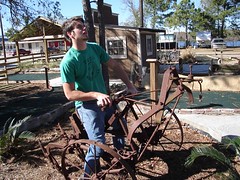Wackily uneven article from the New Yorker on the contemporary evaluation of the changing place of Judas in Christian/(religious) discourse. Some good analysis, but when the bulk of the article actually entertains Susan Gubar as a Biblical and religious scholar worth regarding, you've got problems.
Among several, here's the loftiest unsupported generalization, regarding the reception of the recently discovered 'Gospel of Judas': "What use could this bizarre document be to modern Christians? Plenty. Many American religious thinkers are more liberal than their churches. They wish that Christianity were more open—not a stone wall of doctrine. To these people, the Gospel of Judas was a gift. As with the other Gnostic gospels, its mere existence showed that there was no such thing as fixed doctrine, or that there wasn’t at the beginning."
woo woo!
http://bit.ly/fqo27
7.30.2009
7.22.2009
playlist
1. Kings of Leon - Notion
2. Taking Back Sunday - A Decade Under the Influence
3. Solomon Burke - That's How I Got to Memphis
4. Taylor Swift - Fifteen
5. K'naan - Dreamer
6. Garth Brooks - That Summer
7. Kashmer Stage Band - All Praises
8. MxPx - Dolores
9. Coldplay - Strawberry Swing (Live)
10. The Juliana Theory - DTM
11. Tom Waits - Picture in a Frame
12. The King's Singers - Loch Lomond
13. Eminem - Sing for the Moment
14. Brand New - Seventy Times 7
15. Stars - Barricade
16. Journey - When You Love a Woman
17. Electric Six - Electric Demons in Love
18. The Avett Brothers - I and Love and You
2. Taking Back Sunday - A Decade Under the Influence
3. Solomon Burke - That's How I Got to Memphis
4. Taylor Swift - Fifteen
5. K'naan - Dreamer
6. Garth Brooks - That Summer
7. Kashmer Stage Band - All Praises
8. MxPx - Dolores
9. Coldplay - Strawberry Swing (Live)
10. The Juliana Theory - DTM
11. Tom Waits - Picture in a Frame
12. The King's Singers - Loch Lomond
13. Eminem - Sing for the Moment
14. Brand New - Seventy Times 7
15. Stars - Barricade
16. Journey - When You Love a Woman
17. Electric Six - Electric Demons in Love
18. The Avett Brothers - I and Love and You
7.21.2009
"Just as we were all, potentially, in Adam when he fell, so we were all, potentially, in Jerusalem on that first Good Friday before there was an Easter, a Pentecost, a Christian, or a Church. It seems to me worth while asking ourselves who we should have been and what we should have been doing. None of us, I'm certain, will imagine himself as one of the Disciples, cowering in agony of spiritual despair and physical terror. Very few of us are big wheels enough to see ourselves as Pilate, or good churchmen enough to see ourselves as a member of the Sanhedrin. In my most optimistic mood I see myself as a Hellenized Jew from Alexandria visiting an intellectual friend. We are walking along, engaged in philosophical argument. Our path takes us past the base of Golgotha. Looking up, we see an all too familiar sight-three crosses surrounded by a jeering crowd. Frowning with prim distaste, I say, 'Its disgusting the way the mob enjoy such things. Why can't the authorities execute criminals humanely and in private by giving them hemlock to drink, as they did with Socrates?' Then, averting my eyes from the disagreeable spectacle, I resume our fascinating discussion about the nature of the True, the Good, and the Beautiful.'"
W.H. Auden, reflecting on a quote by Charles Williams: "Our crucifixes exhibit the pain, but they veil, perhaps necessarily, the obscenity: but the death of the God-Man was both."
W.H. Auden, reflecting on a quote by Charles Williams: "Our crucifixes exhibit the pain, but they veil, perhaps necessarily, the obscenity: but the death of the God-Man was both."
Subscribe to:
Posts (Atom)

